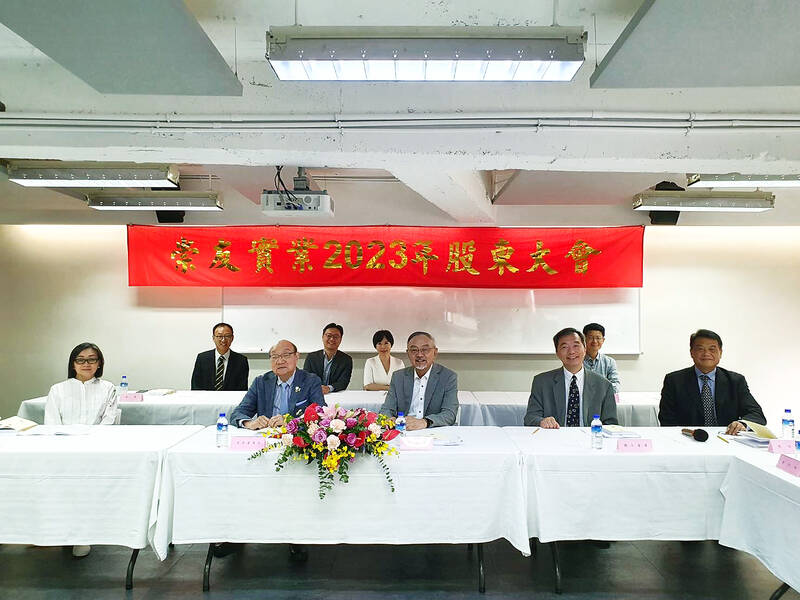Elevator maker Golden Friends Corp (崇友實業) is to increase product prices by 2 to 3 percent next month to reflect mounting raw material and maintenance costs, unfazed by softening property transactions.
The Taipei-based company, which supplies elevators under the GFC and Genesis brands, and distributes Japan’s Toshiba elevators, on Monday said that the price hikes would add to a cumulative 10 percent increase after two previous adjustments last year for similar reasons.
Golden Friends Corp said at the company’s annual general meeting in Taipei that it is upbeat about its business for the rest of this year with NT$7.8 billion (US$252.26 million) of backlog on hand.

Photo courtesy of Golden Friends Corp
In particular, the company is to benefit from a newly opened mixed-use complex in Taipei’s Dazhi (大直) area, the forthcoming Forward Hotel (馥華酒店) in New Taipei City’s Banciao District (板橋) and a luxury residential building in Taichung, it said.
The company’s consolidated revenue in the first five months of this year rose by 11.94 percent year-on-year to NT$2.03 billion. Revenue last year increased 2.92 percent to NT$4.74 billion, while net profit increased 8.99 percent to NT$847.81 million, a company record.
The company said new office buildings and urban renewal projects across Taiwan, in addition to the government’s public works projects, would imply demand for new elevators and regular maintenance services.
Golden Friends Corp expects sales of new elevators this year to be flat due to subdued property transactions, it told shareholders.
The company’s maintenance business would grow 3 percent this year, as it has secured contracts to service 41,000 elevators, and the number might rise by another 1,600 to 2,000 by the end of the year, it said.
Its replacement arm is emerging from the COVID-19 pandemic with sales of 310 elevators for the year to last month, compared with 496 for the whole of last year, the company said.
Shareholders on Monday approved a company proposal to distribute a NT$3.4 per share cash dividend based on last year’s earnings per share of NT$4.79.

To many, Tatu City on the outskirts of Nairobi looks like a success. The first city entirely built by a private company to be operational in east Africa, with about 25,000 people living and working there, it accounts for about two-thirds of all foreign investment in Kenya. Its low-tax status has attracted more than 100 businesses including Heineken, coffee brand Dormans, and the biggest call-center and cold-chain transport firms in the region. However, to some local politicians, Tatu City has looked more like a target for extortion. A parade of governors have demanded land worth millions of dollars in exchange

An Indonesian animated movie is smashing regional box office records and could be set for wider success as it prepares to open beyond the Southeast Asian archipelago’s silver screens. Jumbo — a film based on the adventures of main character, Don, a large orphaned Indonesian boy facing bullying at school — last month became the highest-grossing Southeast Asian animated film, raking in more than US$8 million. Released at the end of March to coincide with the Eid holidays after the Islamic fasting month of Ramadan, the movie has hit 8 million ticket sales, the third-highest in Indonesian cinema history, Film

Taiwan Semiconductor Manufacturing Co’s (TSMC, 台積電) revenue jumped 48 percent last month, underscoring how electronics firms scrambled to acquire essential components before global tariffs took effect. The main chipmaker for Apple Inc and Nvidia Corp reported monthly sales of NT$349.6 billion (US$11.6 billion). That compares with the average analysts’ estimate for a 38 percent rise in second-quarter revenue. US President Donald Trump’s trade war is prompting economists to retool GDP forecasts worldwide, casting doubt over the outlook for everything from iPhone demand to computing and datacenter construction. However, TSMC — a barometer for global tech spending given its central role in the

Alchip Technologies Ltd (世芯), an application-specific integrated circuit (ASIC) designer specializing in server chips, expects revenue to decline this year due to sagging demand for 5-nanometer artificial intelligence (AI) chips from a North America-based major customer, a company executive said yesterday. That would be the first contraction in revenue for Alchip as it has been enjoying strong revenue growth over the past few years, benefiting from cloud-service providers’ moves to reduce dependence on Nvidia Corp’s expensive AI chips by building their own AI accelerator by outsourcing chip design. The 5-nanometer chip was supposed to be a new growth engine as the lifecycle